This is a quickie - woke up late, kinda hungover, great party at JP's last night, crawled home around 4 am, got to also wear a blonde wig and drink (at least in the beginning) some really nice red wine.
Off to Bozar for the India exhibit - I probably will spend a bit of time every weekend there as there is so much to see, but I have to rush as N's train arrives soon from the NDLs. Here is the link to the bozar festival:
http://www.bozar.be/activity.php?id=6466&
We are in the middle of sending out the invites (finally!) and people seem to love them! I have about 18-20 friends coming from my side - not counting family and family friends. Sadly, some of my oldest and closest friends won't be able to make it - I totally understand - between jobs and babies etc., life is pretty hectic, in addition to India being an expensive destination to fly to. What is nice is a chance to collect everyone from different parts and times of my life togehter, in one place. I'm realising the magic of marriage now - it gives us a chance to celebrate the very thing that makes us humans tick - LOVE (shared between partners, family and community)!
Last two thoughts of this quickie: 1. Gave in Resignation Letter on Monday; 2. Have to put links to friends blogs.
A take on Ondaatje's poem and my "nom de guerre" - though my only claim to resistence is this blog: A text(ile)quilt, made up of pieces on politics and pop, style and theory, tidbits of thoughts on the Indian diaspora and migration, and stories on living in Los Angeles - for now -(bye bye Brussels!)
Saturday, October 21, 2006
Thursday, October 12, 2006
Photos from the Middle East
Finally, a few photos of the trip to Syria, Jordan and Lebanon - with a big thanks to my co-traveller and good friend, H - who was the official photographer of the trip and as you can see did a great job (click on each photo):
1. On the road to Damascus...
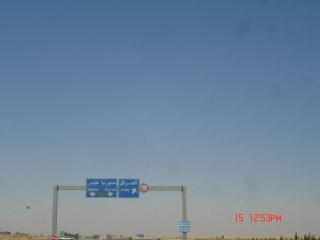
2. 50 Cent in Beirut
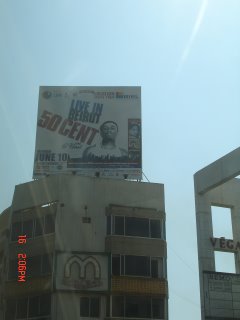
3. Hezbollah being welcomed back
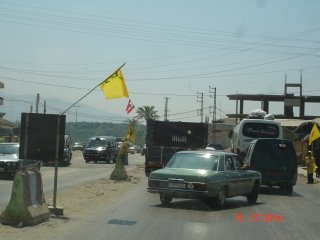
4. Destruction along the coastal highway into Beirut
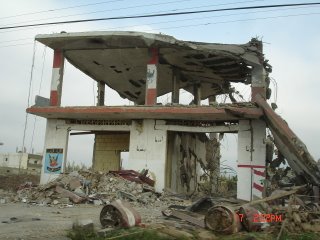
5. Damascus 1
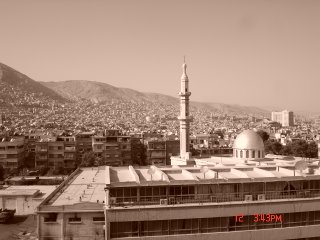
6. Damascus 2
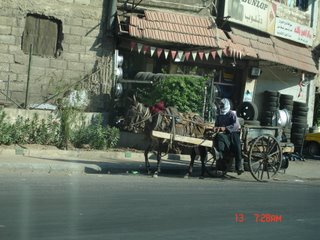
7. One of my border pals
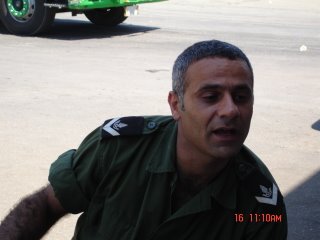
8. Entering Damascus in the afternoon
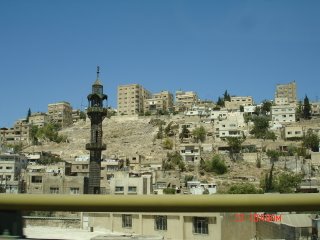
9. Construction in the desert
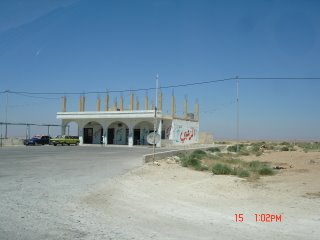
10. Middle class dreams - Amman
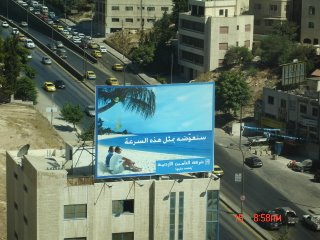
1. On the road to Damascus...

2. 50 Cent in Beirut

3. Hezbollah being welcomed back

4. Destruction along the coastal highway into Beirut

5. Damascus 1

6. Damascus 2

7. One of my border pals

8. Entering Damascus in the afternoon

9. Construction in the desert

10. Middle class dreams - Amman

Reading Maximum City in LaLa Land
Well, I'm in LaLa Land for 3 days, visiting the boy, and essentially coming to terms with the idea that I will soon be living here! First of all, let me say the weather is, as usual, just simply gorgeous. That should be enough of a reason to joyfully move I guess...especially after Brussels!
I read Suketu Mehta's "Maximum City: Bombay Lost and Found" in one day - I literally gobbled it up yesterday, reading on the plane, at UCLA and then at home. I loved it in the same way that I adore good ice-cream, it is delicious and easy to eat, even filing and arguably nutritious, but while lacking something substantial, still rumination provoking. Mehta made me once again consider (and face) the deep anti-Pakistani sentiment we Indians seem to share and our more hidden, anti-Muslim feelings. It is as if for our country to exist we have to create an opposite to measure ourselves against – we are secular, they are religious; we are open, they are closed; we are democratic, they are despotic etc etc. While India is, as pointed out by Mehta, surrounded by Muslim countries, the only one that engages our imagination as much and that we struggle against, both at our borders and in our hearts, is Pakistan.
Mehta talks a lot about Bombay as this big mixing and melting pot and I'm trying to remember how it was living in Juhu, just opposite Sea Princess (mentioned in the book) - I guess ours are what Mehta calls a "cosmopolitan" building/buildings. We had Catholics, Parsis, Jains, and Hindus living and playing together. In addition, the families were Bengali, Maharashtrian, Gujarati, Goan, East Indian, Punjabi, etc. We had only one Muslim family (in the building next to ours), with a son named like the famous Pakistani cricket captain (ahem). I don't remember any slurs being tossed about by us kids – we did have the occasional joke, usually about the Parsis, and made by the Parsis, but it seemed that though we were aware of our differences, we continued to exchange sweets on holy days and generally felt a bond based on the buildings we lived in (Neptune, vs. Sea Queen etc) rather than along religious or regional lines. In fact we even had kids who were from "mixed marriages", which in those days was quite adventurous and basically meant a Punjabi married to a Gujarati, or a Parsi married to a Catholic. I do remember talking to the building boys about the first set of Hindu-Muslim riots as one of them (a Hindu) had a Muslim girlfriend. I guess I was lucky that my first images of life and of India were so heterogeneous. Strangely though, while different boys pursued us, and we flirted back, I don’t remember us ever considering a relationship (a teenage love) with anyone non-Catholic - that seemed somewhat out of bounds.
What does all the above, my first influences on love and longing, say about my current choice?
I also took note of Mehta's naming of Northwest Bombay, in particular, Juhu and Bandra, as the Beverly Hills of Bombay, "where the stars live and work" (p155- Number two after Scotland Yard). In some bizarre cosmic way, back again, here I am in star-studded land, especially if we end up living in West Hollywood - actually all a waste on me - because though I love the movies, I'm just not infatuated by the stars (of neither Hollywood nor Bollywood). I have memories of going to some Bollywood royalty’s houses, and seeing them at weddings and the clubs we just naturally frequented in our area, but never running after them. I guess we were blasé about it because we went to school with their kids and lived in the midst of them.
The parts of the book that I enjoyed the most were the discussions on the links and similarities between organised crime and terrorism. I agree that there is a litany of global woes of jihadists - and not without some basis - from Afghanistan, to Chechnya, to Palestine, to Bosnia, to Kashmir, and now to Iraq (and possibly Gujarat), which not only reinforces the idea of Islamaphobia but focuses on each crisis as a matter of survival of Islam (the global fight), so that territorial disputes such as Kashmir, Chechnya and Palestine are elevated to struggles of the "uma" and equated with the authentic acts of genocide against Muslims, such as Bosnia and Gujarat. What Mehta clearly shows is that terrorism is just another name for organised crime, this time just adopting and using a larger cause than just money or fame to achieve the same prize – power. The “partnerships” built up between terrorist groups such as the LTTE and Al Qaeda and the IRA and between terrorist groups and gangland (Dawood in the case of Bombay, but the Chechen mafia in Russia) show that blowing someone up for religion or land is the same as shooting them for debts not paid.
In the end, I feel that what Mehta really does a good job highlighting, is a Bombayite’s love for Bombay, the very idea of Bombay vs. Mumbai, and the need for a symbol of a city like Bombay in the minds of Indians and the Indian national story. In many ways, Bombay, like the Quit India struggle, is one of the strong threads binding the patches of cloth that make up the Indian quilt.
I read Suketu Mehta's "Maximum City: Bombay Lost and Found" in one day - I literally gobbled it up yesterday, reading on the plane, at UCLA and then at home. I loved it in the same way that I adore good ice-cream, it is delicious and easy to eat, even filing and arguably nutritious, but while lacking something substantial, still rumination provoking. Mehta made me once again consider (and face) the deep anti-Pakistani sentiment we Indians seem to share and our more hidden, anti-Muslim feelings. It is as if for our country to exist we have to create an opposite to measure ourselves against – we are secular, they are religious; we are open, they are closed; we are democratic, they are despotic etc etc. While India is, as pointed out by Mehta, surrounded by Muslim countries, the only one that engages our imagination as much and that we struggle against, both at our borders and in our hearts, is Pakistan.
Mehta talks a lot about Bombay as this big mixing and melting pot and I'm trying to remember how it was living in Juhu, just opposite Sea Princess (mentioned in the book) - I guess ours are what Mehta calls a "cosmopolitan" building/buildings. We had Catholics, Parsis, Jains, and Hindus living and playing together. In addition, the families were Bengali, Maharashtrian, Gujarati, Goan, East Indian, Punjabi, etc. We had only one Muslim family (in the building next to ours), with a son named like the famous Pakistani cricket captain (ahem). I don't remember any slurs being tossed about by us kids – we did have the occasional joke, usually about the Parsis, and made by the Parsis, but it seemed that though we were aware of our differences, we continued to exchange sweets on holy days and generally felt a bond based on the buildings we lived in (Neptune, vs. Sea Queen etc) rather than along religious or regional lines. In fact we even had kids who were from "mixed marriages", which in those days was quite adventurous and basically meant a Punjabi married to a Gujarati, or a Parsi married to a Catholic. I do remember talking to the building boys about the first set of Hindu-Muslim riots as one of them (a Hindu) had a Muslim girlfriend. I guess I was lucky that my first images of life and of India were so heterogeneous. Strangely though, while different boys pursued us, and we flirted back, I don’t remember us ever considering a relationship (a teenage love) with anyone non-Catholic - that seemed somewhat out of bounds.
What does all the above, my first influences on love and longing, say about my current choice?
I also took note of Mehta's naming of Northwest Bombay, in particular, Juhu and Bandra, as the Beverly Hills of Bombay, "where the stars live and work" (p155- Number two after Scotland Yard). In some bizarre cosmic way, back again, here I am in star-studded land, especially if we end up living in West Hollywood - actually all a waste on me - because though I love the movies, I'm just not infatuated by the stars (of neither Hollywood nor Bollywood). I have memories of going to some Bollywood royalty’s houses, and seeing them at weddings and the clubs we just naturally frequented in our area, but never running after them. I guess we were blasé about it because we went to school with their kids and lived in the midst of them.
The parts of the book that I enjoyed the most were the discussions on the links and similarities between organised crime and terrorism. I agree that there is a litany of global woes of jihadists - and not without some basis - from Afghanistan, to Chechnya, to Palestine, to Bosnia, to Kashmir, and now to Iraq (and possibly Gujarat), which not only reinforces the idea of Islamaphobia but focuses on each crisis as a matter of survival of Islam (the global fight), so that territorial disputes such as Kashmir, Chechnya and Palestine are elevated to struggles of the "uma" and equated with the authentic acts of genocide against Muslims, such as Bosnia and Gujarat. What Mehta clearly shows is that terrorism is just another name for organised crime, this time just adopting and using a larger cause than just money or fame to achieve the same prize – power. The “partnerships” built up between terrorist groups such as the LTTE and Al Qaeda and the IRA and between terrorist groups and gangland (Dawood in the case of Bombay, but the Chechen mafia in Russia) show that blowing someone up for religion or land is the same as shooting them for debts not paid.
In the end, I feel that what Mehta really does a good job highlighting, is a Bombayite’s love for Bombay, the very idea of Bombay vs. Mumbai, and the need for a symbol of a city like Bombay in the minds of Indians and the Indian national story. In many ways, Bombay, like the Quit India struggle, is one of the strong threads binding the patches of cloth that make up the Indian quilt.
Subscribe to:
Posts (Atom)